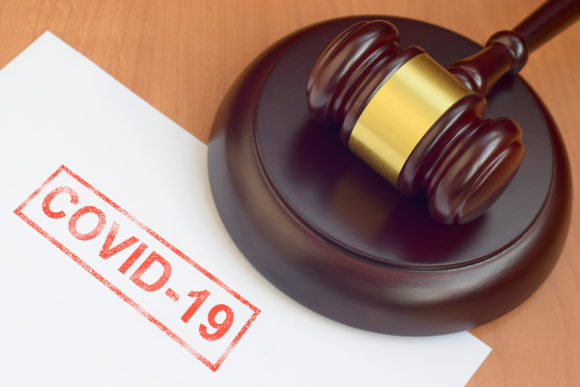A recent ruling from a Michigan judge that business interruption claims payouts require tangible alteration to a property may have sounded like a knockout win for the insurance industry but a legal expert has a slightly different take.
Tom Baker, the William Maul Measey Professor at the University of Pennsylvania, said a defective pleading stands in the way of viewing Judge Joyce Draganchuk’s verbal ruling in Gavrilides Management Company et al. vs. Michigan Insurance Co. as the “textbook ruling” that the industry has been waiting for.
He also called a case being tried in London this week a “one-way ratchet” for insurers—meaning that a ruling in favor of the insurers in that case does little to help the industry cause while a ruling against insurers would be a defeat on both sides of the Atlantic.
Baker’s remarks came last week during a “COVIDigation Trends” webinar hosted by RiskGenius and its CEO and co-founder, Chris Cheatham.
Cheatham offered the “textbook” description of the U.S. ruling after playing a video of Judge Draganchuk’s analysis in which she said: “Under their common meanings and under federal case law…that interprets this standard form of insurance, ‘direct physical loss of, or damage to, the property’ has to be something with material existence, something that is tangible, something…that alters the physical integrity of the property.”
Tamping down a bit on the hyped post-ruling celebration across the industry, Baker said: “The thing I would want to point out is that this complaint didn’t [actually] plead ‘physical loss of, or damage to,’ the building. They pled simply that it was shut down….In the long run, it may be that this is how it comes out but this particular case can be explained as a defective pleading on the part of the plaintiffs.”
In the Michigan case, the attorney for the plaintiff, Matthew Heos of the Nichols law firm, had argued that a government order that restricted business to dine-in only patrons amounted to a physical loss because the order effectively blocked public entry to the property—an argument that the judge said was “simply nonsense.”
She did not address the presence of a virus exclusion in the policy, Cheatham noted.
“Because you don’t need to—and that just relates to the structure of the way that insurance litigation works,” Baker explained. “First, it’s the obligation of the policyholder to prove that [its interruption] comes within coverage. If the policyholder fails at that, then [the court doesn’t] have to go to the question of whether there’s an exclusion that applies, which is the insurer’s burden,” the law professor and insurance expert explained.
Baker noted that he has seen media reports about the presence of a virus exclusion giving carriers another reason they wouldn’t have to pay the claim. The issue didn’t surface, Baker said, noting what he viewed as an impressive strategy from the defense attorney and the insurers.
“They did a gutsy thing,” focusing on the “direct physical loss of or damage to” wording, in spite of the fact that there is indeed “a good, from their perspective, virus exclusion” in the policy. “The carrier, I think, was playing the long game and was thinking, ‘You know what? It’s going to be more valuable for us if we get this ruling based on the physical loss or damage to property because that protects us, even if we somehow issued a policy that didn’t have the virus exclusion.'”
Across the Ocean
As Baker and Cheatham were discussing what many viewed as the first significant ruling in the U.S. on the question of whether a property insurer is liable for financial damages caused by a COVID shutdown order, the high court in London was hearing early arguments in a test case filed by the Financial Conduct Authority (FCA) to get legal clarity on BI coverage questions. (In particular, the FCA case focuses on BI claims under coverage extensions which are not dependent on physical damage—on whether non-damage BI claims are valid.) The hearing is scheduled to conclude on July 30.
“I think it’s a one-way ratchet: If the carriers lose or end up having a lot of coverage, that’s going to be bad for them here” in the U.S.,” said Baker. “I think if the carriers win, the insurance policies there are really different. They tend to be named-peril rather than all risks policies. I think it will be easy to distinguish them,” he continued.
“If there’s bad rulings or positive rulings, either way, from the FCA cases, [then] obviously that’s going to be big news in the insurance industry,” Cheatham said. “I think the insurers, if you ask them, they’d probably prefer to have positive results, not headlines blaring that businesses are recovering. We’ve already seen one of those headlines from France,” he said, referring to a Paris court ruling that AXA had to pay a restaurant owner’s virus-related revenue losses.
“You don’t want to see a wave of those headlines because those start trickling down in our Internet-based society these days,” Cheatham concluded.
Was this article valuable?
Here are more articles you may enjoy.


 Asbestos Lawsuits Prompt Vanderbilt Minerals to File Bankruptcy
Asbestos Lawsuits Prompt Vanderbilt Minerals to File Bankruptcy  UK Floods Raise Specter of ‘Mortgage Prisoners’ Across Banks
UK Floods Raise Specter of ‘Mortgage Prisoners’ Across Banks  Building Fortification And The Role of The Insurance Industry
Building Fortification And The Role of The Insurance Industry  Tesla’s Austin Robotaxis Report 14 Crashes in First Eight Months
Tesla’s Austin Robotaxis Report 14 Crashes in First Eight Months 